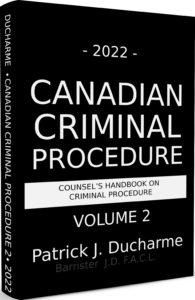 |
| Patrick Ducharme |
This duty to be fair includes:
1 making full disclosure of its case to the defence and continuing to make that disclosure in a timely way throughout the criminal trial process.
2 not misleading the court.
3 not offering personal opinions on the evidence or on the credibility of witnesses or on the guilt or innocence of the accused.
4 not arguing any facts that have not been proven.
5 refraining from asking questions that relate to irrelevant matters or designed solely to embarrass, insult, abuse, belittle, or demean any witness or any person involved in the case.
6 not misstating the law intentionally in oral or written submissions.
7 refraining from disrespect for the court or its judicial decisions and refraining from publicly disparaging judgments or rulings of the court;
8 not participating in efforts to select or attempt to place the case before a Judge that the prosecutor believes is likely to be favourable to her case, often referred to as “Judge shopping.”
9 Not to act in any manner beneficial to the prosecutor personally or for someone the prosecutor wishes to help without disclosing a personal connection, bias, or favouritism.
10 presenting all proper legal authorities to the court, even those decisions that may be unfavourable to the position of the prosecution.
11 never permitting personal or political interests to interfere with proper prosecutorial exercise of discretion.

The above is the an excerpt of Patrick J Ducharme's book, Canadian Criminal Procedure Volume 2, available at Amazon or in bulk through MedicaLegal Publishing along with Criminal Trial Strategies.
Subscribe to Patrick Ducharme's Youtube Channel
